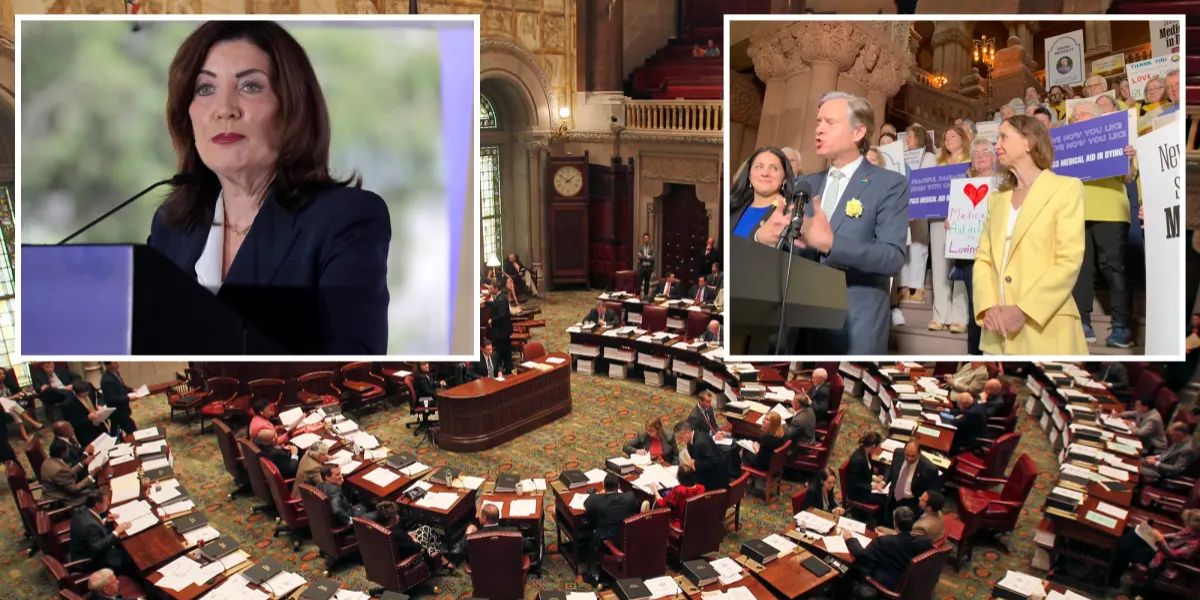In a close vote on Monday, state Senate Democrats passed a highly contentious bill that would permit terminally ill patients to end their lives with medical assistance. Governor Kathy Hochul will now have to decide whether to sign the bill into law.
The bill’s sponsor in the upper chamber, state Senator Brad Hoylman-Sigal (D-Manhattan), praised the measure at a press conference earlier Monday, calling it “one of the great social reforms of our state” and placing it on par with the legalisation of gay marriage.
Hoylman-Sigal went on, “This is about personal autonomy, this is about liberty, this is about exercising one’s own freedom to control one’s body.”
Six Democrats, including Senators April Baskin, Siela Bynoe, Cordelle Cleare, Monica Martinez, Roxanne Persaud, and Sam Sutton, voted against the measure, which passed 35 to 27.
“The legislation will be reviewed by the governor,” a Hochul representative stated.
The passage of the bill comes after a protracted campaign that was fiercely opposed by a wide range of opponents, including the Catholic church, disability rights advocates, and numerous members of the Black and Orthodox Jewish communities.
Following the vote, The New York Alliance Against Assisted Suicide released a statement saying, “The Governor still has the opportunity to uphold New York’s commitment to suicide prevention, protect vulnerable communities, and affirm that every life—regardless of disability, age, or diagnosis—is worthy of care, dignity, and protection.”
A Catholic organisation urged Hochul to decline to sign the bill and denounced its passage as “a dark day for New York.”
“For the first time in its history, New York is on the verge of authorizing doctors to help their patients commit suicide. Make no mistake – this is only the beginning, and the only person standing between New York and the assisted suicide nightmare unfolding in Canada is Governor Hochul,” Dennis Poust, Executive Director of the New York State Catholic Conference stated.
Several senators refrained from crying as they defended their votes during the nearly three-hour-long Senate floor debate that preceded the vote.
State in the Syracuse area Sen. Rachel May (D-Onondaga) related the tale of her late husband, who was on morphine in the last stages of his fight against cancer before passing away at age 32.
“I don’t know if the last largest dose he took also took his life, but I know that he died in peace,” May stated.
Before casting her vote in favour, she stated, “It is about having control at the end of your life, not about controlling the disease or the pain.”
Critics believe the law is missing important protections that would allow doctors to approve patients seeking a prescription for a deadly combination of drugs. These protections include a statutory waiting period, a clear chain of custody for the pills, a requirement that the doctor and the patient meet in person, and a requirement that a disclosure be made that someone actually used the drugs to end their own life.
Read Also: Trump Says He’d Arrest Gavin Newsom After California Governor Dares Border Czar
According to the bill, recipients would be prescribed medications that they could use to end their lives whenever they choose, but only after receiving approval from two physicians and a sign-off from two impartial witnesses.
Physicians may refer patients for a mental health screening under the law, but they are not required to perform one for every patient.
“I don’t think requesting end-of-life medication when an individual is suffering and in pain and dying suggests a mental health condition, if anything, I think it’s quite rational,” Hoylman-Sigal stated.
Hoylman promised that there would be no such “unintended consequences” from the bill.
“It was a professional organization that provided us crucial guidance, that helped us develop the state-of-the-art safeguards in this legislation that gave my colleagues and the general public, I believe, the assurance that there will not be unintended consequences,” he stated.
Supporters of the legislation call it the “Medical Aid in Dying” bill.



